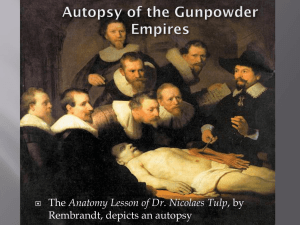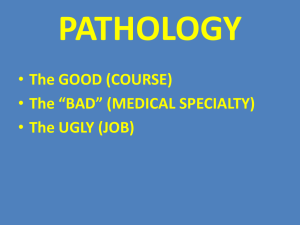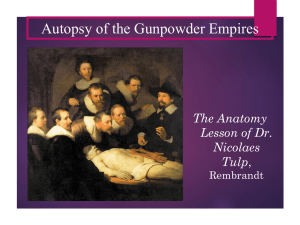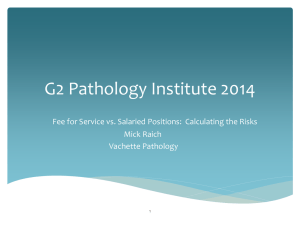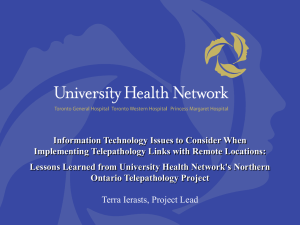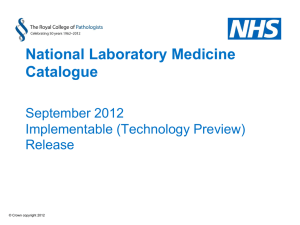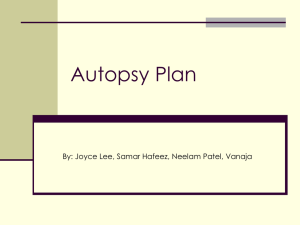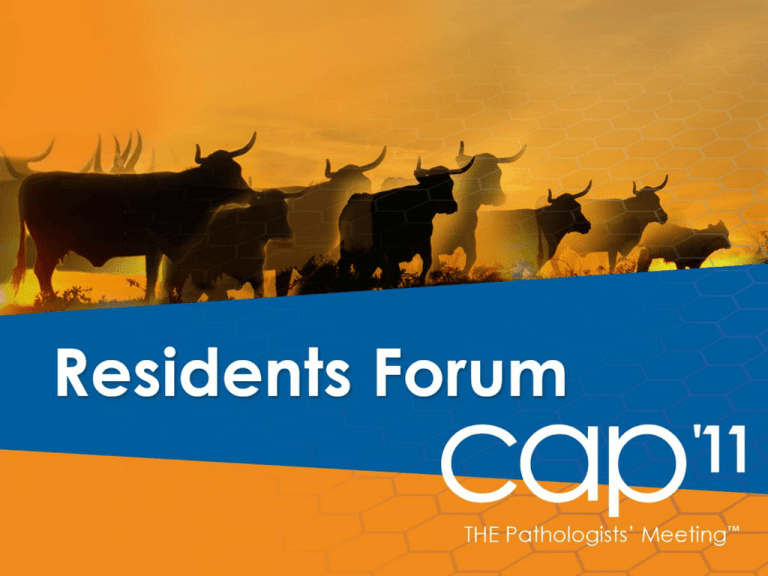
Residents Forum at CAP ‘11
Saturday, September 10, 2011
Grapevine, Texas
• Morning Joint Session with House of
Delegates
• Residents Forum Morning Session
• Joint Lunch sponsored by PathPAC
• Residents Forum Afternoon Session
© 2011 College of American Pathologists. All rights reserved.
2
NewsPath™
• CAP publication
• Junior Members:
• Articles are:
o 500 words
o Write articles with
mentors
o Peer-reviewed
o Get on iTunes
o Newsworthy
o Join RSS Feed
o Visit:
cap.org/newspath
o Blog/Retweet
© 2011 College of American Pathologists. All rights reserved.
@pathologists
3
Town Hall
•
Betsy D. Bennett, MD, PhD, FCAP
Executive Vice President
American Board of Pathology (ABP)
•
William F. Hickey, MD, FCAP
CAP Governor
•
Henry M. Rinder, MD, FCAP
American Society for Clinical Pathology (ASCP) Resident In-Service
Examination (RISE) Committee Chair
•
Suzanne Z.E. Powell, MD, FCAP
APC Program Directors Section (PRODS) Chair
Accreditation Council for Graduate Medical Education (ACGME) Residency
Review Committee Chair
•
Michael L. Talbert, MD, FCAP
CAP Graduate Medical Education Committee Chair
Association of Pathology Chairs, Inc. (APC) Representative
© 2011 College of American Pathologists. All rights reserved.
4
RISE correlation with ABP outcomes
454 residents graduating in 2008
424 graduating in 2009
All were first-time takers of 2008 and/or
2009 ABP certifying examinations in AP
and/or CP
All had evaluable data from their senior
RISE in spring 2008 or 2009
We correlated RISE scores with pass/fail
results on AP/CP certifying exams
Appears in Oct AJCP issue
2008 AP RISE
sections
AP BOARD - PASSED VS FAILED
1000
P=0.07
*P<0.001
*P<0.001
Q1
MIN
800
MEDIAN
MAX
RISE Score
Q3
600
400
200
PASSED
FAILED
Autopsy Forensic Pathology
PASSED
FAILED
Cytopathology
2008 RISE AP Sections
PASSED
FAILED
Surgical Pathology
2008 CP RISE
sections
CP BOARD - PASSED VS FAILED
1000
*P<0.001 for all
Q1
800
MIN
MEDIAN
RISE Score
MAX
Q3
600
400
200
PASSED
Clinical Chemistry
FAILED
PASSED
Hematology
FAILED
PASSED
Microbiology
2008 RISE CP Sections
FAILED
PASSED
FAILED
Transfusion Medicine
RISE quartiles & pass
rates for ABP
RISE
score
quartiles
1st quartile
2nd
quartile
3rd
quartile
4th
quartile
Exam pass rate (n=454) for 2008
graduates and RISE score range
Exam pass rate (n=424) for 2009
graduates and RISE score range
97%, 565
92%, 532-564
100%, 533
99%, 500-532
86%, 505-531
94%, 473-499
46%, < 505
66%, < 472
Fewer than half of 2008 graduating residents in the bottom
quartile passed all of their certifying examinations.
In a post-hoc analysis, we found that slightly more than
two-thirds (69%) of 2008 graduating residents who were
in the lowest quartile for the 2008 RISE were also in the
lowest quartile for their 2007 (junior) RISE scores
Conclusions
RISE and most sectional mean scores were
between 45 to 75 points higher for those passing
the certifying examinations but even greater gap in
Surgical Pathology section
Passing rates for the certifying examinations
declined with each quartile of overall RISE scoring
RISE scores under the 50th percentile – some risk
of failing a certifying exam
Bottom quartile of RISE results – definitely an atrisk group for failing
Junior year’s RISE results – may identify
2011 Fellowship/Job Market Survey results:
www.ascp.org/residents
Newly Elected RFEC Members
• Chair
o Nicole Riddle
• Alt Del to AMA RFS
o Daniel Wimmer
• Vice Chair
o Roseann Wu
• Alt Del to CAP HOD
o Erin Consamus
• Secretary
o Christine
Jabcuga
• Member-at- Large
o Lauren King
© 2011 College of American Pathologists. All rights reserved.
10
Continuing RFEC Members
• Immediate Past Chair
o Jerad Gardner
• Del to AMA RFS
o Crystal Trujillo
• Del to CAP HOD
o Ricardo Mendoza
© 2011 College of American Pathologists. All rights reserved.
11
HOD/RF and Networking
• Interactive joint sessions at
meetings
o Speaker panel
o Round table discussion
• Networking reception at meetings
• More residents involved in HOD
AGs
© 2011 College of American Pathologists. All rights reserved.
12
Training Program Issues
•
ACGME Duty Hours
•
Met with members of ACGME and
Pathology RRC
•
Led discussions on Wiki and via email on
how to implement new duty hours
guidelines
•
New goals to be decided based on
residents’ concerns
•
Examples to of how programs are
implementing ACGME changes to be
posted on Wiki
© 2011 College of American Pathologists. All rights reserved.
13
External Electives
• ACGME does allow
o Requires proper documentation
• CMS does technically allow
o Only non-provider sites (???)
o Or fill out official paperwork
• CMS does not allow just leaving your institution unofficially.
Options
• If program has more residents than allotted – Not CMS funded
• Vacation/sick leave (last resort!)
Remember
• Numerous grants available
• CAP, ASCP, and independent labs
© 2011 College of American Pathologists. All rights reserved.
14
Board Prep: Application
Spring 2012 AP/CP Exams:
• www.abpath.org - PATHway
• Registration opens Sept 2011
• Final filing date Jan 15, 2012
• Final late filing date Feb 15, 2012
• Program Director approvals and evaluations due
Feb 1, 2012
• Date assignments Mar 2012
• Cancellations
• Exams begin May 14, 2012
• Results posted 4 to 6 weeks after the final week
of examinations
© 2011 College of American Pathologists. All rights reserved.
15
Board Prep: Requirements
• Complete training by July 1 for the spring
exam and November 1 for the fall exam.
• Hold a non-restricted medical license.
• 50 autopsies
o Age, sex, primary diagnosis, and date
performed
• Change for 2013 exam: Fetopsies
o Autopsy consent, intact fetus, placenta
included
o No more than 5 IUFD only, no more than 2
macerated
© 2011 College of American Pathologists. All rights reserved.
16
Board Prep Survey: Top 3 Resources
AP
• Lefkowitch Anatomic Pathology Board Review
• Osler Pathology Board Review Course
• Surgical Pathology Unknown Conference
CP
• Osler Pathology Board Review Course
• ASCP Resident Review Course
• Koneman’s Color Atlas and Textbook of Diagnostic
Microbiology
© 2011 College of American Pathologists. All rights reserved.
17
Board Prep Survey: Review Courses
• Osler Pathology Board Review Course
• ASCP Review Course
• 47.9% took a review course.
• 60% recommend using resources from a
review course.
• 1 to 6 months prior to the exam
Familiarize yourself with virtual microscopy!
© 2011 College of American Pathologists. All rights reserved.
18
Board Prep Timeline
• Start of residency • 1 week of
assignment date
o Logs
o Reservations
o Daily education
• 4-6 weeks after
• 6 months prior
o Receive results
o Study in earnest
o Need full license
o Turn in app
© 2011 College of American Pathologists. All rights reserved.
19
Board Travel:
Transportation and Hotel
• Airports
o Tampa International
o St Pete/Clearwater
o Orlando
• Ground Transportation
o Hotel shuttle, car rental
• Arrive the day before, or earlier
• InterContinental Hotel
o Recommended hotel, connected to test site
o ABP rate
• Ramada Westshore Tampa
© 2011 College of American Pathologists. All rights reserved.
20
Board Exam: Necessities
• Photo ID
• ABP-provided blue exam ID card
© 2011 College of American Pathologists. All rights reserved.
21
Board Exam
Bring to exam center
Bring to cubicle
• Cell phone, pager,
laptop
• Earplugs
• Drinks
• Facial tissue
• Food/snacks
• Polarizers
• Medications
• Layered clothing
© 2011 College of American Pathologists. All rights reserved.
22
Board Exam: Virtual Tour
© 2011 College of American Pathologists. All rights reserved.
23
Board Exam
•
•
•
•
•
ABP blue ID card on desk
Blank paper for notes/calculations
Microscope
Adjustable chair
Sample questions
Time Management:
• Prepare early/schedule/plan.
• Answer questions you know first.
• Save calculations for last.
• Watch time/pace yourself.
• Go fast.
• Some had no issue with time.
© 2011 College of American Pathologists. All rights reserved.
24
After the Board Exam
• Keep contact information updated
on ABP website!
• Time Limited Certificates
• Maintenance of Competence
• CME
© 2011 College of American Pathologists. All rights reserved.
25
Decreasing Hospital Autopsies
Burton, JL and Underwood, J, “Clinical, educational, and epidemiological value of autopsy.” Lancet 2007, 369:1471-80.
De Vlieger, GYA, et al. “Clinical review: What is the role for autopsy in the ICU?” Critical Care 2010, 14:221.
Hull, MJ, et al. “Resident physician opinions on autopsy importance and procurement.” Human Pathology 2007, 38: 342350.
© 2011 College of American Pathologists. All rights reserved.
26
Autopsy Survey Methods
• 2010 Survey to PRODs
• 2011 Survey to Residents & Fellows
o April 2011
o 206 surveys completed by junior
panel members
o 90% confidence that responses
were +/- 5% accurate
© 2011 College of American Pathologists. All rights reserved.
27
2011 Autopsy Survey
Participants' Profile
•
•
•
•
•
20% First Year Residents
16% Second Year Residents
13% Third Year Residents
11% Fourth Year Residents
40% Fellows
• 79% work in university hospitals.
• 14% work in community hospitals (university
affiliated).
© 2011 College of American Pathologists. All rights reserved.
28
Autopsy Survey Results
• The majority of the participants received 4-5 months of
Autopsy (including forensics) during their residency
training.
• Who obtained the autopsy permit?
o Decedent affairs: >41%
o Resident: 31%
• Overall, 80% felt that they had sufficient training to
perform autopsies in clinical practice.
• About 50% agreed or strongly agreed that if they were
to perform less than 50 autopsies, they would still be
competent.
© 2011 College of American Pathologists. All rights reserved.
29
Autopsy Survey Results
• About 58% did not share autopsies.
• 68% strongly disagreed or disagreed that sharing
cases lead to inadequate autopsy skills.
• 74% stated that sign out was with faculty non-boarded
in forensics.
• 81% agreed or strongly agreed that they could easily
meet the ACGME requirement at their institution.
• Most stated that 50 autopsy requirement could be
maintained.
• 31% wanted the requirement decreased to less than
50.
• 21% wanted it eliminated.
© 2011 College of American Pathologists. All rights reserved.
30
Selected Comments
• “[Autopsy's] value as a clinical service is overemphasized. Residency training is short and with only
4 years to become competent in general surg path,
cytopath, heme path, derm path, clin path, etc, 6
months is too much time....”
• “I think that autopsies will continue to decrease and
eventually be replaced with whole body CT scanning
with minimally invasive autopsies and limited tissue
sampling.”
• “The number of cases should remain at 50. If
programs are having difficulties attaining that number,
lobbying should be done by pathology organizations
to emphasize the need for autopsies so that
appropriate funding can be obtained.”
© 2011 College of American Pathologists. All rights reserved.
31
Results of 2011 vs 2010
Autopsy Surveys
• Residents with significantly lower perception vs PRODs
• Ability to complete 50 autopsies at their institution
• Ability to perform autopsies as paramount to finding
good employment
• Sharing autopsies results in residents with inadequate
autopsy skills.
• Maintaining autopsies at or increasing the number to
greater than 50
© 2011 College of American Pathologists. All rights reserved.
32
Results of 2011 vs 2010
Autopsy Surveys
• Residents with significantly higher
perception vs PRODs
• Decreasing the number of autopsies
to less than 50
• If number were less than 50, should
still be able to perform competent
clinical autopsies
© 2011 College of American Pathologists. All rights reserved.
33
Suggestions for Improvement
• Increase awareness through presentations,
pamphlets with scripts for residents to use
• Develop interdepartmental Autopsy
conferences
• Improve quality of report and make it more
patient-friendly
• Survey clinician and patient attitudes toward
autopsy
• Propose limited autopsy to patients
© 2011 College of American Pathologists. All rights reserved.
34
www.pathinfo.wikia.com
© 2011 College of American Pathologists. All rights reserved.
35
Pathology Wiki
(www.pathinfo.wikia.com)
• Directory of path residency/fellowship
programs
o Goal: Complete and Up-to-date
o Links to program websites
o Reviews of programs
• Immunostain wiki
• Board prep info
• Pathology links
• Directory of private and academic practices
© 2011 College of American Pathologists. All rights reserved.
36
Job Hunting and Contract
Negotiations Panelists
•
•
•
•
•
Chad R. Rund, DO, FCAP
Head of Gastrointestinal Pathology Services - Greensboro Pathology
Associates, Greensboro, NC
General Surgical, Gastrointestinal and Liver Pathology (Private)
Miriam Post, MD, FCAP
Assistant Professor, University of Colorado - Denver, CO
Gynecologic and Obstetric Pathology (Academic)
Noel A. Brownlee, MD, PhD, FCAP
Pathologist - Upstate Pathology, PA - Greenville, SC and Associate Professor of
Pathology - VCOM Carolinas Campus
Pulmonary, Urologic and Molecular Pathology – (Private + Academic)
Amanda E. Wehler, DO, FCAP
Medical Director, Transfusion Medicine - Geisinger Medical Center,
Danville, PA
Transfusion Medicine (Private)
Jack R. Bierig, JD
Sidley Austin, LLC, Chicago, IL
General Counsel for CAP for 25 years, represents a number of pathology
practices, teaches Health Law and Policy at the University of Chicago
Job Hunting and Contract
Negotiations
10 things to consider during job hunting:
1. How cutting edge is the work the group does? A
group that is in the forefront of new procedures is
more likely to succeed.
2. How involved are they with the medical staff and
administration? A group that is involved is more
likely to retain its relationships
3. How is the group compensated? A group that is
less dependent on the hospital for all its revenues is
more likely to do well.
Job Hunting and Contract
Negotiations
10 things to consider during job hunting:
4. How entrepreneurial/innovative is the group? A
group that is looking for new business opportunities
is also more likely to succeed.
5. What happened to young hires? The experience of
your predecessors is the best predictor of what will
happen to you.
6. Will you be working at the main hospital or satellite
location? You should have an understanding of
where your principal practice will be.
Job Hunting and Contract
Negotiations
10 things to consider during job hunting:
7. What percentage of your practice will be in the
specialty of your choice? You may want to know
the extent to which you can specialize.
8. What are the salary and benefits? This point needs
no explanation.
9. Try to get any "non-compete" clause removed or
limited. You don’t want to be barred from practicing
in the same area if things don’t work out.
Job Hunting and Contract
Negotiations
10 things to consider during job hunting:
10. What are the people like in the group?
This is probably the most important point.
You want to work with good people whom
you like and respect.
Networking Tips
• Break the ice
• Make yourself
memorable
• Close the deal
• Follow up
© 2011 College of American Pathologists. All rights reserved.
• Use orange bold
to emphasize
text.
• Avoid overformatting.
• Do not use all
capital letters.
42

